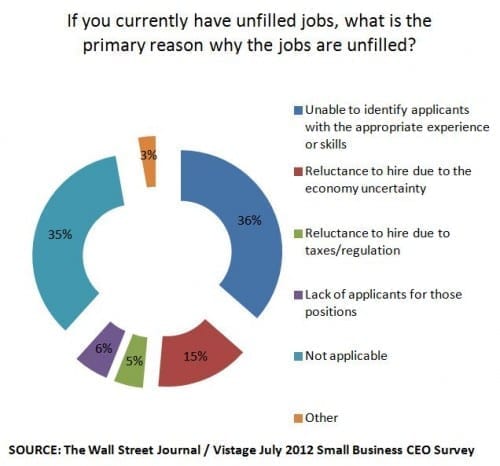Skills Gap: Myth or Truth?
I am curating this post because it is a must read for our profession! Premise: Is the gap more about our hiring "foibles" or a true lack of skill? #shrm #hr #tchat #hiring
Skills Gap: Myth or Truth?
Skills Gap, My Foot!
from The Atlantic
I encourage you to read this article! In it, Barbara Kaviat says:
“A recent employer survey found that the top skill deficiency among manufacturing workers wasn’t technical expertise, but “inadequate problem-solving skills.”
and
In many cases, the sorts of “skills” employers want — problem-solving, creativity — demand better thinking and communication…The critical skills gap may not be what we think. If candidates and new hires lack the soft skills and emotional intelligence required, they won’t make it through the interview process or if they do, they probably will not last in their job. I think that’s a bigger problem than a technical skills shortage. More people than ever before are returning to school to update technical skills. Where are they developing the critical soft skills companies are seeking?
Companies have a very difficult time screening and evaluating soft skills during the interview process. Behavioral based interviewing is one way to analyze candidate’s soft skills. But, have companies taken the time to evaluate what soft skills they are looking for so they will know them when they see them? This is difficult, especially for a small company without trained recruiting staff.
Job seekers should be prepared to provide specific examples of their previous performance by using accomplishment stories known as PAR, CAR, STAR or SOAR. Additionally, it can’t help to do some self analysis and work on some of the lacking areas such as interpersonal communication. Does anyone know how you develop problem-solving skills?
You’re small and need to grow, but can’t find people. Really?

Small Firms Seek Skilled Workers but Can’t Find Any by The Wall Street Journal showcases examples of small businesses around the country and the problems they are having finding and keeping employees to grow their business. The examples include:
>>>A company that installs alarms and video surveillance in homes and commercial properties has had two openings for over 18 months.
Reason not filled: Candidates misrepresent (overestimate) their skills, want more money or are looking for easier work.
>>>Another company has been looking for an administrative assistant:
Reason not filled: They mostly see overqualified candidates and believe they won’t last in the job.
A company that makes smartphone apps can’t find skilled candidates.
Outcome: Hired and trained some employees but they found the job too daunting (my note: unsure if they quit or were fired)
These don’t really sound like skills gap issues. Work ethic, values, societal shifts and perhaps poor hiring criteria seem to better describe these scenarios.
If it looks like a duck, swims like a duck, and quacks like a duck, then it probably is...
No one wants to do dull, dirty, grunt work, unless they see a reason to. That reason is different based on the individual. If small companies are having problems filling jobs then part of the answer lies in how they are representing the work. Companies need to sell more than just the J O B.Employers take note. If you can’t find the employees you want to do the work you need done, then take a look at the work you are asking to be done. If it is crap work, what can you do to make it less crappy? Think long and hard. And money counts! Are your wages competitive? Try looking at the total compensation package and get creative. Flex schedules, PTO and other things make a big difference to many Gen Y and Gen X candidates.
Out of work job seekers: Stop being so picky. Who said you have to do the job forever? Build some new skills, earn some money and add value to the company. Then you can move on. Isn’t A job better than NO job?
My Opinion
I see this as an easy excuse for both parties involved. What I think needs to happen is less finger pointing and more ownership. Companies that seriously want to grow need to learn how to hire the right people. They are out there. They may not have every skill listed but close enough! Invest just a bit of time bringing them up to speed!Job seekers, you need to learn how to position your skills in a way employers will want to hire. That means learning how to sell yourself and clearly communicate what your value is to your future employers. A bit of common sense around showing up on time and doing the job well wouldn’t hurt either!
Curator: Ok fellow colleagues...let's chime in here...your thoughts???
Facebook:www.facebook.com/joanncorley.the1percentcoach
Connect on LinkedIn -http://www.linkedin.com/in/joanncorley
Its true and you can't call it myth. Thanks for bringing this online. Job Proposals
ReplyDeleteinadequate problem-solving skills leads towards HR hierarchy into disaster ones. i like that way you justify your words in post by adding hr survey poll
ReplyDeleteThanks for the comments!
ReplyDelete